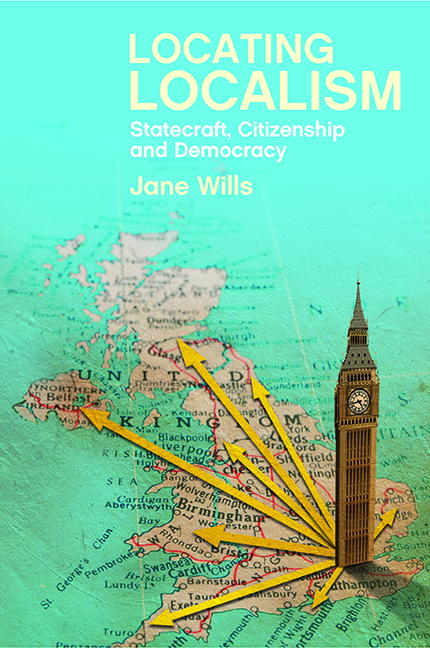Book contents
- Frontmatter
- Dedication
- Contents
- List of figures and tables
- Acknowledgements
- Introduction: the argument being made in this book
- one Making sense of localism
- two The geo-constitution and the long history of localism
- three The place of the people
- four Localist local government
- five Institution building for localist futures
- six Community organising: past, present and future
- seven A localist future?
- Appendix: Research design and methods
- References
- Index
Appendix: Research design and methods
Published online by Cambridge University Press: 05 April 2022
- Frontmatter
- Dedication
- Contents
- List of figures and tables
- Acknowledgements
- Introduction: the argument being made in this book
- one Making sense of localism
- two The geo-constitution and the long history of localism
- three The place of the people
- four Localist local government
- five Institution building for localist futures
- six Community organising: past, present and future
- seven A localist future?
- Appendix: Research design and methods
- References
- Index
Summary
The research presented in this book was developed as part of a Major Research Fellowship funded by the Leverhulme Trust between and 2012 and 2015 entitled Place and politics: Localism in the United Kingdom. The fellowship aimed to ‘explore the reasons why the local is being mobilised and prioritised at this particular time; consider people's attitudes towards place and whether they want to take a greater role in political life and the conditions in which they do so; chart the outcomes of top-down and bottom-up localism; and determine whether localism is a viable route to democratic renewal.’ The project coincided with the election of a new Conservative-led government that made a full and public commitment to pursuing localism. As such, the research was well placed to track the unfolding localist agenda of the government, focusing on the particular policy measures adopted (such as NCBs and neighbourhood planning) while also taking a broader perspective. Given the growing interest and activity around localism, it has been impossible to be comprehensive, but the aim has been to look at a series of case studies in the context of the wider policy change.
The research presented was conducted via four separate projects of varied design, duration and content, and the research conducted is summarised briefly below.
1 Poplar Neighbourhood Community Budget, 2012–13 (Chapter Three)
I was involved in the learning and evaluation of the pilot NCB in Poplar, East London, from June 2012 until the submission of a final report in March 2013. While analysts at the DCLG conducted a light-touch evaluation of all the pilots and later published a comprehensive report (Rutherfoord et al, 2013), each of the 12 project teams was urged to include its own learning and evaluation activity, and a number similarly developed links with academic researchers. The staff running the Poplar Neighbourhood Community Budget (PNCB) appointed me as an evaluator and I worked with Erica Pani to: record and assess the processes involved in developing the PNCB; identify success (particularly in relation to community consultation and co-design); and highlight any obstacles and the ways they could be overcome. From the outset, the PNCB team was aware and supportive of the overlaps between this evaluation activity and the larger research project written up in this book.
- Type
- Chapter
- Information
- Locating LocalismStatecraft, Citizenship and Democracy, pp. 209 - 216Publisher: Bristol University PressPrint publication year: 2016



